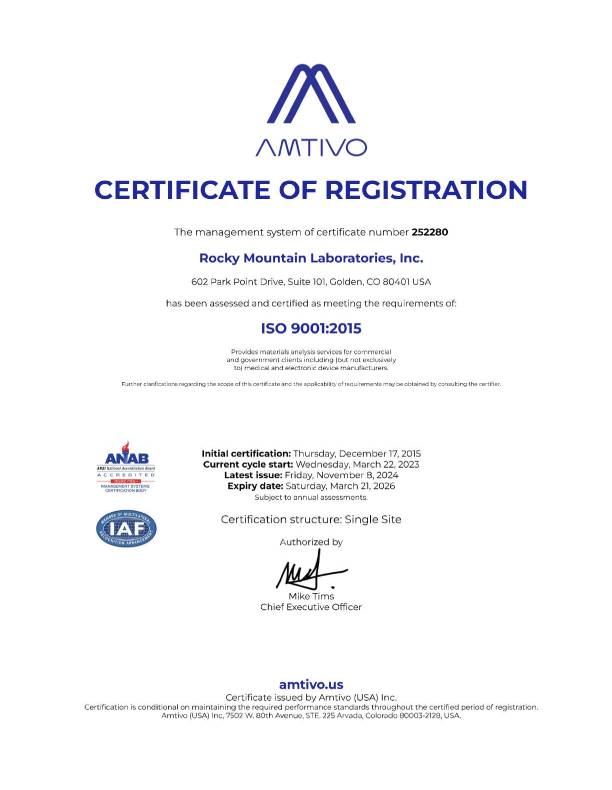In the realm of particle analysis, precision and detailed characterization are paramount. At Rocky Mountain Laboratories, we leverage the power of Scanning Electron Microscopy (SEM) to unravel the intricate details of particles, providing valuable insights for a wide range of industries.
Applications of SEM Analysis in Particle Characterization:
- Particle Morphology Studies: SEM enables the detailed examination of particle morphology, offering insights into shape, size distribution, and surface characteristics. This is crucial for industries such as pharmaceuticals, materials science, and environmental monitoring, where particle properties directly impact product performance.
- Quality Control in Manufacturing: SEM analysis is instrumental in quality control processes, allowing manufacturers to ensure uniformity and consistency in particle-based products. This is particularly relevant in industries producing powders, pigments, and other particulate materials.
- Identification of Unknown Particles: SEM can be employed to identify and characterize unknown particles in diverse samples. This capability is invaluable in forensic investigations, environmental analysis, and the identification of contaminants in various products.
Methodology of SEM Analysis for Particle Characterization:
- Sample Preparation: Careful sample preparation is a critical step in SEM analysis for particle characterization
- Instrumentation: Our cutting-edge SEM instruments at Rocky Mountain Laboratories are equipped with advanced detectors capable of high-resolution imaging.
- Microstructural Analysis: Skilled analysts at our laboratories utilize SEM to delve into the microstructure of particles. High-resolution imaging reveals details such as surface roughness, porosity, and internal structures, providing a comprehensive understanding of particle characteristics.
Advantages of SEM Analysis in Particle Characterization:
- High Resolution and Magnification: SEM provides unparalleled high-resolution imaging, enabling the observation of particles at the micro- and nanoscale. This level of magnification is essential for capturing fine details and nuances in particle morphology.
- Elemental Analysis Capability (EDS): The integration of Energy-Dispersive X-ray Spectroscopy (EDS) with SEM allows for elemental analysis of particles. This feature is crucial for identifying the elemental composition of particles and understanding their chemical nature.
- Quantitative Data Acquisition: SEM analysis allows for quantitative data acquisition, including measurements of particle size, shape, and distribution. This quantitative approach is essential for statistical analysis and ensuring reproducibility in research and industrial processes.
Rocky Mountain Laboratories stands as a leader in SEM analysis for particle characterization, providing precise insights that drive advancements in various industries. Whether you are engaged in materials research, quality control, or process analysis, our specialized expertise in SEM ensures accurate and detailed particle characterization, empowering your efforts in understanding and optimizing particulate materials.



